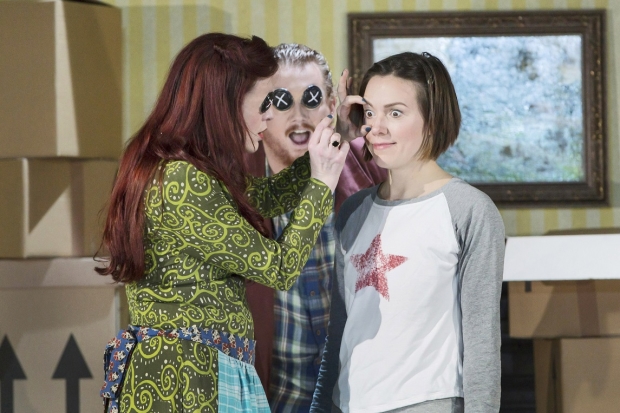Review: Coraline (Barbican Theatre)
Neil Gaiman’s fantasy novel becomes an opera by Mark-Anthony Turnage

© Stephen Cummiskey
Not a children’s opera but an opera for children, the first Royal Opera commission from Mark-Anthony Turnage since Anna Nicole is a sturdy adaptation of Neil Gaiman’s nightmarish romp. It’ll give strong stomachs a caffeine hit so don’t expect a quiet ride home; queasier souls may find it over-stimulating. As rattling good theatre for pre- to early teenagers Coraline ticks all the boxes, but, as with the tale’s mirror version of our heroine’s mother, there’s something not quite right about it.
Coraline is a bored young tween who resents her parents and longs for life to bring her something more exciting than dad's parsnip soup. In a mirror world beyond her own she finds it, battles dark forces and eventually realises how lucky she is to be ordinary.
The Royal Opera has invested top dollar in Aletta Collins‘ production and, wisely, chosen to stage it not at its own grand pile but in the less forbidding Barbican Theatre. On opening night the place teemed with youngsters who clearly had a ball. The exit chatter was wildly enthusiastic, because Collins and her design team have concocted a knockout spectacle with nifty scene changes, cool lighting and a disembodied hand that’s quite a thing.
It’s just that no one was talking about the music.
"That was awesome! The hand was great," declared a child. "It has its root in video games," noted a nerdy teenager. "That’s what’s so clever." All true, as it would still have been if Rory Mullarkey’s tight, taut libretto had been a play and not a text for singing. Turnage is a considerable composer with a formidable track record, and I thought Anna Nicole was a bit brilliant; but in Coraline his score is the weak link in a strong chain.
'A missed opportunity'
Some new operas are just musicals where the tunes don’t work. This is one of them. Delightful passages of aerated orchestration were perfectly rendered by conductor Sian Edwards and 16 virtuosi from the Britten Sinfonia, but the scenic business muscled its way centre-stage and turned the sound into mood music. The score needs either strong melodies or a filmic atmosphere; it gets neither. Perhaps Turnage chose the wrong format for such a plot-driven tale, because there are so many moments when it cries out for a production number. A comic song for the unretiring actresses Miss Spink and Miss Forcible, please. An insidious earworm for the three ghost children. A diva-monster showstopper for the Other Mother.
Instead, Turnage gives us professionally crafted passages to advance the story, punctuated by brief, jazzy interpolations that pop in and out like visiting wasps. The most arresting inspiration is his eerie spirit music for the offstage ghosts; for the rest it’s a missed opportunity. And there’s a long section in Act Two that sounds suspiciously like note-spinning.
The seven-strong cast gave it their all, led by two superb performances: soprano Mary Bevan as a properly three-dimensional Coraline, and mezzo Kitty Whately who feasted on furniture as the good and bad Mothers. Alexander Robin Baker was excellent value as the Fathers – I loved his excruciating dad-dabbing – while Gillian Keith and Frances McCafferty were great fun as the faded actresses.
Would a concert performance reveal more in Turnage’s score? From a single hearing it’s hard to say, but I wouldn’t expect miracles. Such things were the province instead of Collins and her designer, Giles Cadle, whose clean, geometric transformation scenes brought the story to life and sent me home whistling (as they say) the scenery.
Coraline plays at the Barbican Theatre until 7 April.












